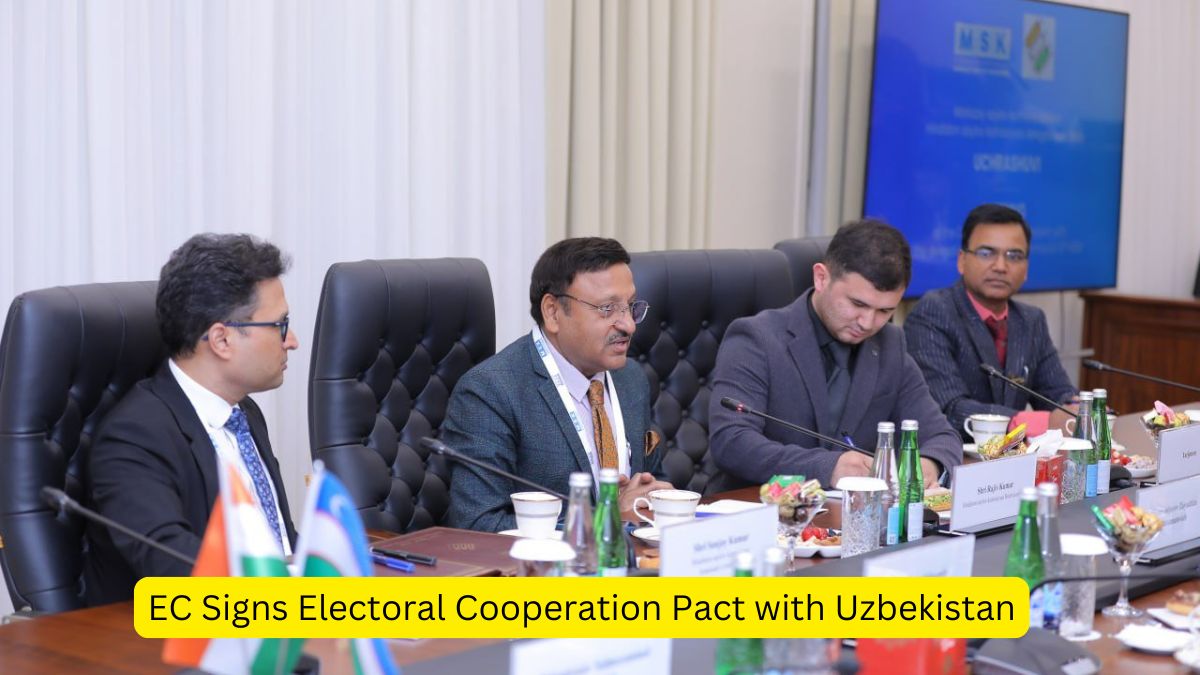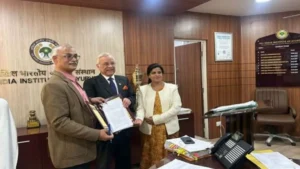The Election Commission of India signed an agreement for electoral cooperation with Uzbekistan’s central poll body. This agreement was formalized during Chief Election Commissioner Rajiv Kumar’s visit to Tashkent, where he is serving as an international observer for the upcoming elections scheduled for October 27.
Purpose of the Agreement
- The Memorandum of Understanding (MoU) aims to strengthen and deepen interaction between the two Election Management Bodies (EMBs).
- The agreement is designed for the mutual benefit of both democracies.
Background
- Both electoral bodies have a history of mutual cooperation, with officials serving as observers in each other’s elections.
- A four-member delegation from Uzbekistan, led by Khusanova Mukhtabar, participated in India’s Lok Sabha elections earlier this year.
Global Interaction
- The Election Commission of India and the Central Election Commission of Uzbekistan actively engage through international forums, including the Association of World Election Bodies and the Association of Asian Election Authorities.
International Collaboration
- The EC has signed MoUs for international cooperation with 30 EMBs globally.
- Collaboration extends to The International Institute for Democracy & Electoral Assistance, which supports sustainable democracy worldwide.
Significance
- The agreement is expected to enhance electoral processes and share best practices between India and Uzbekistan, contributing to stronger democratic frameworks in both countries.
About Election Commission of India (ECI)
- The Election Commission of India (ECI) is a permanent and independent body established by the Constitution of India to ensure free and fair elections in the country.
- Since it is established directly under the provisions of the Constitution, it is a Constitutional Body.
- The ECI is an All-India body in the sense that it is common to both the Central and the State governments.
The Constitution vests the Election Commission of India (ECI) with the power of superintendence, direction, and control of elections to,
- Parliament – Lok Sabha and Rajya Sabha
- State Legislatures – State Legislative Assembly and State Legislative Council (if exist)
- Office of President of India
- Office of Vice-President of India
Constitutional Provisions related to ECI
- Article 324 of the Constitution of India deals with the provisions related to the Election Commission of India (ECI).
- The article contains detailed provisions regarding the composition of the ECI, appointment and service conditions of its members, powers and functions of the ECI, and other related aspects.
Composition of Election Commission of India
Article 324 of the Constitution has made the following provisions about the composition of the Election Commission of India,
- It shall consist of the Chief Election Commissioner (CEC) and such number of other Election Commissioners (ECs) as the President may from time to time fix.
- The appointment of CEC and other ECs shall be made by the President.
Term of Members of ECI
- According to the Election Commission (Conditions of Service of Election Commissioners and Transaction of Business) Act, 1991, the Chief Election Commissioner and the Election Commissioners hold office for a term of 6 years or until they attain the age of 65 years, whichever is earlier.
Resignation of Members of ECI
- According to the Election Commission (Conditions of Service of Election Commissioners and Transaction of Business) Act, 1991, the Chief Election Commissioner and the Election Commissioners can resign at any time by writing to the President.
| Summary/Static | Details |
| Why in the news? | The Election Commission of India signed an agreement for electoral cooperation with Uzbekistan’s central poll body. |
| Purpose of MoU | To strengthen and deepen cooperation between the two Election Management Bodies (EMBs) for mutual benefit. |
| Background | – Both countries have a history of cooperation, with officials observing each other’s elections.
– Uzbekistan’s delegation participated in India’s Lok Sabha elections. |
| Significance | Enhances electoral processes, shares best practices, and contributes to strengthening democratic frameworks in both countries. |
| Election Commission of India (ECI) | – A constitutional body, established to ensure free and fair elections.
– Powers extend to elections for Lok Sabha, Rajya Sabha, State Legislatures, and Offices of President and Vice-President of India. |
| Constitutional Provisions (Article 324) | Details the composition, powers, and functions of the Election Commission of India. |




 Why the Adani-Marseille Pact Could Be a ...
Why the Adani-Marseille Pact Could Be a ...
 AIIA Signs MoU with General Insurance Co...
AIIA Signs MoU with General Insurance Co...
 Bharat Taxi Partners with AAI to Launch ...
Bharat Taxi Partners with AAI to Launch ...








